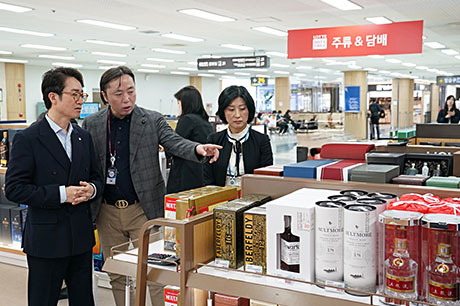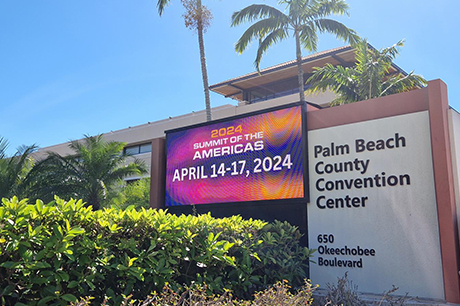MEADFA Conference in Doha: Day 2
By Doug Newhouse |

The second day of this week’s MEADFA Conference was entitled “Coping with change” with a good early attendance for the first morning session.
This followed the previous evening’s well attended (fun) Gala Dinner, which was sponsored and organised very generously by the host organisation, Qatar Duty Free.
The first session on the second day of the conference was introduced by Dermot Davitt and Michael Barret and examined the economic crisis in Cyprus, the fall out from the political unrest in North Africa and the Levant and how retailers are trying to adapt their commercial strategies to these fast changing trading environments.
Participants in this interesting session included Aer Rianta International-Middle East Managing Director Philip Eckles, Dufry Middle East & India Deputy COO Iain Forrest and Chalhoub Group General Manager, Travel Retail, John Reynolds.
All three commented on the tenders and development at Cairo Airport, with Reynolds pointing to the $14.5bn project to redevelop Cairo Airport probably due to start next year if the country settles down, while the government is trying to simultaneously get tourism back, although this is obviously tough.

Left to right: Dufry Middle East & India Deputy COO Iain Forrest, Chalhoub Group General Manager, Travel Retail, John Reynolds, and Aer Rianta International-Middle East Managing Director Philip Eckles.
ARI’s Philip Eckles said his company’s seven-year consultancy contract with Cairo Airport only ended two years ago, so ARI is well placed to look at these 5-year contracts.
RISK ANALYSIS
However, both Dufry’s Iain Forrest and Eckles made the point that it is difficult to assess the risk factors in this market with only five years operation on offer and Reynolds pragmatically added that it is simply necessary to participate in these contracts, since they are not coming around again for at least five years.
These regional tenders (already reported by TRBusiness.com) also include Kuwait Airport which all said they were well aware of, with Chalhoub having been a past duty free operator there.
Interestingly, Dufry’s Forrest said that the retailer’s focus has been on the Asia Pacific region for the last 18 months, but now it is concentrating on the Middle East for the next three years.

Aer Rianta International-Middle East Managing Director Philip Eckles.
Turning to Bahrain, Eckles said it was important it was important not to believe everything you read in the press, since normal life continues there, even though there are protests.
As reported by ARI’s CEO Jack MacGowan to TRBusiness back in October, Eckles pointed to the development of Bahrain Duty Free’s arrivals store and plans to invest in the departures stores in the early part of next year.
He said Bahrain Duty Free’s announced nine-month results show that profitability remains on track, despite passenger numbers being down, while ARI’s joint venture at Beirut Duty Free has reported a record August and will report record sales this year.
RESULTS SPEAK VOLUMES
All this, despite a challenging climate where some countries still have advisories telling their nationals not to visit the country and Lebanese now accounting for the majority of this business.

European Travel Retail Confederation President, Sarah Branquinho.
Moving on to ARI’s significant presence in Cyprus at Larnaca and Pafos airports, Eckles said there have been a number of downsides with the bail out and the drop in GDP, but the tourist business has been maintained and there will be another record this year.
This has also been aided by events in Egypt and the decision of many Russians to switch destinations – and their high spending – to Cyprus.
The general panel conversation then switched to transfer passengers and new potential markets, with Iraq and Pakistan both mentioned and the former said to have potential. At the same time, Dufry’s Forrest said his company is investigating the potential of Bangladesh.
All three executives acknowledged the market potential of Africa, although Reynolds and Eckles agreed that there has to be a sufficient critical mass of passengers to make certain locations work. Forrest also emphasized the importance of find the right local partner in this region.
Back in the Middle East, Forrest said that Dufry has benefited from the strength of Air Arabia at Sharjah Airport there has been a one bag issue there and he said this had been a concern, although the situation is improving. He admitted it had been a worry at a time when there appears to be some relaxation of the one bag rule on the horizon in Europe.
NO ROOM FOR COMPLACENCY
But the industry must not become complacent about this or other threats such as that mentioned by Eckles in the form of tobacco. This was the message from the next conference session on legislative issues, led by European Travel Retail Confederation President Sarah Branquinho and MEADFA President Sean Staunton.
This began with Branquinho taking the audience through the quite complex and very important subject matter relating to the liquids and gels (LAGs) changes that will take place next January and what this actually means for the industry.
Branquinho said it was her great pleasure for once not to be talking about another restriction, but a lifting of a restriction – albeit a qualified one.

She said: “In the European Union and the USA there is going to be a change in the screening regime. Basically, those two areas are moving to screening cabin baggage with liquid explosion detection systems.”
She said there would be no change for passengers flying directly to the European Union and there will be no restrictions on liquids at all, but since 2006 you have not been able to sell to passengers who are transferring in the European Union and that is about to change.
“For the first time since 2006, passengers who are transferring will be able to take their liquids, aerosols and gels purchased from airport duty free stores, or on airlines in every other country in the world into the European Union and of course into Iceland, Switzerland and Norway which is part of the bloc that’s identified before.
IMPORTANT LAGS CHANGES
“Currently, none of you are allowed to sell to transfer passengers and only Singapore and KL outside the European Union are allowed to do so.

“Passengers will also be able to take liquids, aerosols and gels in the sealed transparent bags, assuming that they are transferring in the USA for the EU, Canada and Australia and currently they can’t do that unless they are repacked when they land in the USA and get their hold luggage bag.
“This is, of course, all subject to the liquids being packed in these now famous ICAO-approved bags.”
She then added that good news is never pure good news since some products that sailed through scanners before may now fail as this scanning technology beds in.
Those products that do trigger an alarm will then be retested and if they fail twice then the passenger will be interviewed to ascertain that neither they nor the product represent any security risk.

She says this is a bit of a worry, since if these products are confiscated, then the much greater use of social media platforms such as Facebook and Twitter could see passengers advising others not to use shops or even a certain airport.
She said the new scanning technology is not perfected yet and the explosive detection systems do have problems screening some products – for example multi-packs can be a problem since the machine can only screen one bottle at a time.
NEW SCANNING CHALLENGES
Similarly, confectionery and tobacco products cannot be put into the same bag because this also confuses the screening readings, as does some metal, wood and ceramics on packaging and bottles, plus thick glass and occasionally unusually-shaped bottles. Other products comprising dense liquids such as maple syrup and some creams can also cause problems, she said.
So the bottom line is that there will be teething problems and manufacturers are already studying why some perfectly safe products fail the screening tests and others don’t and hopefully they will find ways for these new machines and their programming to screen these products out safely in future.
Branquinho said much as already been done with testing carried out in the middle of this year across a wide range of products, involving some 1,061 beauty skus using three of these new machines where 70% of all products passed.
A total of 86% of all alcohol products also passed on all three machines – with these units said to be the ones that most airports are now ordering.

Those manufacturers whose products have raised alarms have all been informed and are looking at what can be done to remove whatever elemental traces may be triggering the screening machines.
All of these results and fact sheets relating to this complex subject and guidelines for retailers, training for staff and STEB compliance can all be obtained from MEADFA, along with Sarah Branquinho’s presentation, so we will not list all of this here.
Significantly, Branquinho added that the industry will now need to work together to fine tune this new screening regime when it comes in next year and one key element to its success that has already been identified will involve good cooperation between the commercial and operational divisions at airports.
TOBACCO HEALTH WARNINGS
This discussion then moved on to the challenges faced by tobacco where MEADFA’s Sean Staunton said that the association is now favouring the international version of health warnings rather than local ones originally being sought in the GCC.
He said the association is not objecting to health warnings and accepts that these are a natural part of the evolution in regulating the product, but it favours uniformity with the rest of the world with international health warnings.

ETRC Secretary General Keith Spinks (above) said that this is very important, when he made a point during questions.
He said it is very important that the industry continues to emphasis that it is a different case to domestic businesses and needs to be treated differently, or it could become swamped by domestic legislation and lose its identity. (Branquinho echoed Spinks’ comments).
As for any other threats to the business in the Middle East, Staunton told moderator Michael Barrett that it was important to make a stand on tobacco, because he believes it will only lead to regulation on other products.
Last, but definitely not least, ETRC’s Branquinho turned her attention to the so called one bag rule which she said had been one of the single most damaging problems for the industry in recent years.
ETRC PUTS ITS FAITH IN LEGISLATION
She also said quite rightly that airports could have guarded against this by putting clauses in their agreements with airlines that they may not interfere with the businesses of airports.
She said that while Ryanair now appears to be relaxing its previous insistence on one carry on bag per passenger, it transpires that the bag it has in mind is no bigger than an A4 sheet in size and the airline may still expect passengers take one bag onboard.
With this set to take place on December 1 she says ETRC will continue to lobby for the well-publicized amendments to the Air Passenger rights agreement to cement the right to two bags firmly into the statute books and so eradicate any misinterpretation of the law.
[TOP IMAGE: Michael Barret, Moderator, Sarah Branquinho, ETRC and Sean Staunton, MEADFA].
Alcohol insights: Conversion up, spend down in Q4
Conversion of visitors in the alcohol category in duty free has risen to 54% in Q4 2023,...
Men buy and spend more in travel retail says new research by m1nd-set
Men have a higher conversion rate and spend more when shopping in travel retail, says new...
Saudia Arabia's KKIA unfurls T3 duty free expansion
King Khalid International Airport (KKIA) has unveiled the first stage of its much-vaunted duty...

In the Magazine
TRBusiness Magazine is free to access. Read the latest issue now.

 Trbusiness. The travel retail Trbusiness. The magazine for global retail and duty free professionals.
Trbusiness. The travel retail Trbusiness. The magazine for global retail and duty free professionals.





















